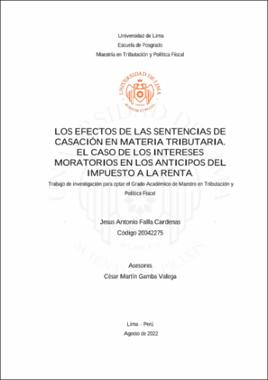Los efectos de las sentencias de casación en materia tributaria. El caso de los intereses moratorios en los anticipos del impuesto a la renta

Ver/
Trabajo
(application/pdf: 604.8Kb)
(application/pdf: 604.8Kb)
Autorización
(application/pdf: 243.6Kb)
(application/pdf: 243.6Kb)
Reporte de similitud
(application/pdf: 15.92Mb)
(application/pdf: 15.92Mb)
Fecha
2022Autor(es)
Asesor(es)
Metadatos
Mostrar el registro completo del ítemResumen
El presente trabajo pretende abordar los efectos de las sentencias de casación en materia tributaria, en el ámbito de actuación de la Administración Tributaria. Este se inicia describiendo de modo general y sucinto en qué consisten las facultades de la Administración Tributaria y las atribuciones del Tribunal Fiscal. Como se sabe, ambos son órganos administrativos que integran el Poder Ejecutivo. Luego, paso a desarrollar cuál es la función del Poder Judicial en un Estado Social, Democrático y Constitucional de Derecho y porque las resoluciones administrativas que causan estado son susceptibles de ser recurridas ante el órgano jurisdiccional a través del denominado Proceso Contencioso Administrativo. En esta etapa eminentemente jurisdiccional, y después de transitar por las instancias correspondientes y de ser el caso, podrá revisarse lo resuelto en segunda instancia a través del denominado recurso de casación, donde la Corte Suprema de Justicia se pronunciará en forma definitiva emitiendo la sentencia casatoria respectiva.
A continuación, se estudiará lo que debe entenderse por jurisprudencia a nivel administrativo y judicial, las diferencias conceptuales entre lo que debe entenderse por pleno casatorio y precedente vinculante; y, si la Administración Tributaria se encontraría vinculada a la jurisprudencia y los precedentes vinculantes emitidos por la Corte Suprema de Justicia en materia tributaria.
Asimismo, y teniendo en cuenta el marco teórico expuesto anteriormente, se analizará un caso controvertido que versa sobre la aplicación de los intereses moratorios a los pagos a cuenta del impuesto a la renta y cómo éste ha sido resuelto en sede administrativa y judicial.
Por último, se efectuará un análisis crítico a un reciente cambio de criterio jurisprudencial relacionado con el tema materia de estudio, al que he denominado el inesperado giro copernicano de la Corte Suprema de Justicia, a propósito de la sentencia de Casación N.º 27444-2018-Lima. The purpose of this paper is to address the effects of Appelate Court Rulings on tax matters, in the scope of action of the Tax Administration. It begins with a general and succinct description of the powers of the Tax Administration and the authorities of the Tax Court. As it is known, both are administrative bodies that are part of the Executive Branch. Likewise, the role of the Judiciary in a Social, Democratic and Constitutional State of law will be develop, as well as the issues regarding why the administrative resolutions that cause status are susceptible to be appealed before the jurisdictional body through the so-called Contentious Administrative Process. In this eminently jurisdictional stage, and after going through the corresponding instances and if it is the case, what is resolved in the appellate court may be reviewed through the so-called cassation appeal, where the Supreme Court of Justice shall issue a final decision by ordering the respective Appelate Court Ruling.
Next, we will study what should be understood by jurisprudence at the administrative and judicial level, the conceptual differences between what should be understood by full cassation and binding precedent; and whether the Tax Administration would be bound to the jurisprudence and binding precedents issued by the Supreme Court of Justice in tax matters.
Likewise, and taking into account the theoretical framework set forth above, a controversial case will be analyzed regarding the application of late payment interest to income tax advance payments and how it has been resolved in administrative and judicial proceedings.
Finally, a critical analysis will be made of a recent change of jurisprudential criteria related to the subject matter of the study, which I have called the unexpected Copernican turn of the Supreme Court of Justice, regarding Appelate Court Ruling N.º 27444-2018-Lima.
Cómo citar
Falla Cardenas, J. A. (2022). Los efectos de las sentencias de casación en materia tributaria. El caso de los intereses moratorios en los anticipos del impuesto a la renta [Trabajo de Investigación para optar el Grado Académico de Maestro en Tributación y Política Fiscal, Universidad de Lima]. Repositorio Institucional de la Universidad de Lima. https://hdl.handle.net/20.500.12724/18038Editor
Universidad de LimaTemas
Coleccion(es)
El ítem tiene asociados los siguientes ficheros de licencia:

